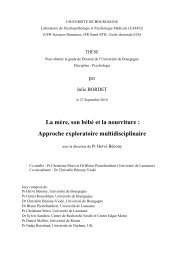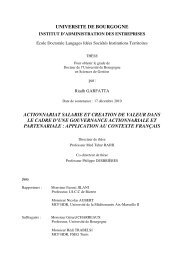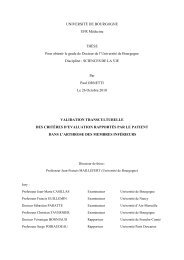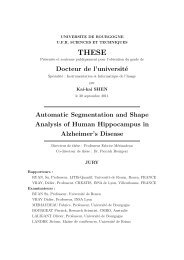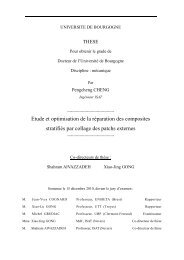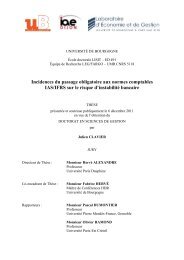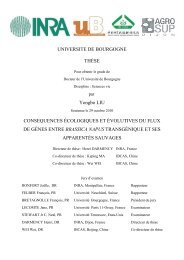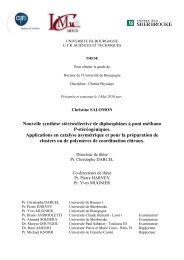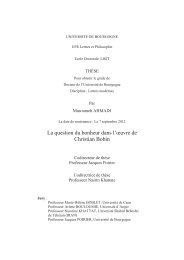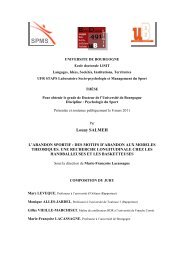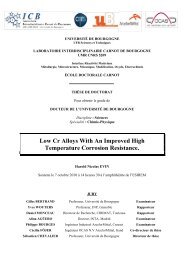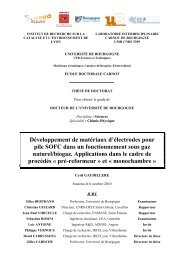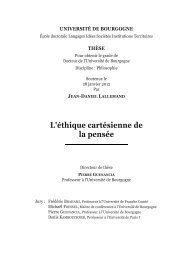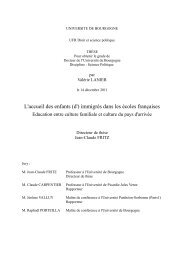Higher education in Asian countries and the role of international ...
Higher education in Asian countries and the role of international ...
Higher education in Asian countries and the role of international ...
You also want an ePaper? Increase the reach of your titles
YUMPU automatically turns print PDFs into web optimized ePapers that Google loves.
256<br />
return provided strong <strong>the</strong>oretical <strong>and</strong> empirical support <strong>and</strong> evidence to advocate higher<br />
<strong>education</strong> resources cut-back-management policies at state <strong>and</strong> organizational levels. These<br />
policies led to resource starvation <strong>of</strong> higher <strong>education</strong> <strong>in</strong>stitutions. Such structural adjustment<br />
programs, <strong>in</strong> most <strong>of</strong> <strong>the</strong> <strong>countries</strong>, shifted <strong>the</strong> focus <strong>of</strong> attention from higher to primary<br />
<strong>education</strong> <strong>and</strong> this shift <strong>in</strong> policy substantially affected <strong>the</strong> capacity, availability <strong>and</strong> quality <strong>of</strong><br />
higher <strong>education</strong> <strong>and</strong> research (Sanyal & Varghese, 2006).<br />
But <strong>in</strong> <strong>the</strong> later years <strong>the</strong> scenario started chang<strong>in</strong>g rapidly <strong>in</strong> <strong>the</strong> favor <strong>of</strong> higher <strong>education</strong><br />
because <strong>of</strong> factors: <strong>in</strong>crease <strong>in</strong> <strong>the</strong> literacy <strong>and</strong> basic <strong>education</strong> rate, enhanced GER at secondary<br />
level, <strong>in</strong>dustrial growth, technological development <strong>and</strong> dawn<strong>in</strong>g <strong>of</strong> digital age. The OECD-UIS<br />
cross national analysis <strong>of</strong> <strong>the</strong> world <strong>in</strong>dicators shows that <strong>education</strong> has a significant positive<br />
impact on <strong>the</strong> earn<strong>in</strong>gs: with each additional level <strong>of</strong> <strong>education</strong> <strong>in</strong>come <strong>in</strong>creases <strong>in</strong> most<br />
<strong>countries</strong>. This study also found that rate <strong>of</strong> returns, both for men <strong>and</strong> women, <strong>in</strong> terms <strong>of</strong><br />
<strong>in</strong>dividual earn<strong>in</strong>g are higher for tertiary <strong>education</strong> as compared to primary <strong>and</strong> secondary<br />
<strong>education</strong> <strong>in</strong> all parts <strong>of</strong> <strong>the</strong> world. Accord<strong>in</strong>g to this study tertiary <strong>education</strong> as compared to<br />
upper secondary <strong>education</strong> has higher positive impact on <strong>the</strong> men‟s earn<strong>in</strong>gs that ranges from<br />
82% <strong>in</strong> Indonesia to approximately 300% <strong>in</strong> Paraguay whereas for women <strong>the</strong>se values range<br />
from 55% <strong>in</strong> Indonesia to 179% <strong>in</strong> Brazil. In Asia <strong>the</strong> variation <strong>in</strong> earn<strong>in</strong>g is low with <strong>the</strong><br />
<strong>in</strong>crease <strong>of</strong> level <strong>of</strong> <strong>education</strong> for both genders. (OECD-UIS, 2002)<br />
OECD, UNESCO <strong>and</strong> <strong>the</strong> World Bank are perform<strong>in</strong>g diverse <strong>and</strong> overlapp<strong>in</strong>g activities to<br />
promote <strong>and</strong> develop higher <strong>education</strong>. These organizations are assist<strong>in</strong>g <strong>countries</strong> <strong>in</strong> <strong>education</strong>al<br />
policy reforms <strong>and</strong> formation; <strong>in</strong> consensus build<strong>in</strong>g among <strong>the</strong> stakeholders; <strong>in</strong> provid<strong>in</strong>g<br />
assistance for capacity development, <strong>and</strong> <strong>in</strong> support<strong>in</strong>g quality <strong>in</strong>itiatives <strong>and</strong> guidel<strong>in</strong>es for cross<br />
border higher <strong>education</strong>. IGOs‟ objectives <strong>and</strong> level <strong>of</strong> engagement <strong>in</strong> common actions po<strong>in</strong>t<br />
towards uniformity <strong>in</strong> <strong>the</strong>ir goals <strong>and</strong> convergence <strong>in</strong> <strong>the</strong>ir attitude as a result <strong>the</strong>se <strong>in</strong>ternational<br />
bodies are <strong>in</strong>fluenc<strong>in</strong>g <strong>in</strong>ternational systems (Jacobson 1984). The <strong>countries</strong> or sub-regions , that<br />
are perform<strong>in</strong>g well also need co-operative support from IGOs <strong>in</strong> fur<strong>the</strong>r<strong>in</strong>g <strong>the</strong>ir objectives <strong>in</strong><br />
<strong>the</strong> development <strong>the</strong>ir higher <strong>education</strong> sector so that <strong>the</strong>y could ma<strong>in</strong>ta<strong>in</strong> <strong>the</strong>ir place <strong>and</strong> position<br />
by achiev<strong>in</strong>g excellence <strong>in</strong> at all levels. As <strong>the</strong>re exists diversity <strong>in</strong> socio-political structure,<br />
culture, <strong>education</strong> systems <strong>and</strong> adm<strong>in</strong>istrative pattern <strong>in</strong> all <strong>countries</strong> so IGOs need to adopt<br />
diversified <strong>and</strong> decentralized policies.



